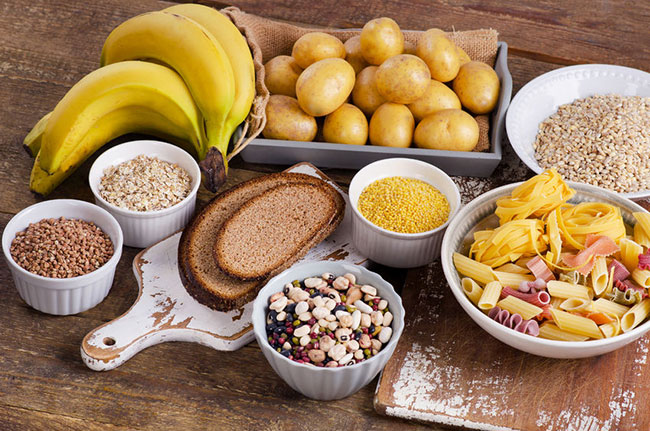Not all carbohydrates are equal and over the years the image of carbohydrates have gone from friend to foe back to friend again depending on what article or “expert” you listen to.
Understanding the role of carbohydrates as part of your nutrition starts with understanding what carbohydrates are. This short review looks at:
- What carbohydrates are;
- What functions carbohydrates have;
- How our body processes carbohydrates;
- How carbohydrates impact areas such as blood glucose, digestive health and activity/exercise;
- What carbohydrates I typically recommend people focus on consuming;
- How much carbohydrate might be right for you.
What are carbohydrates?
Carbohydrates or carbs for short are one of the three main food groups collectively referred to as macronutrients.
In everyday life, we know carbs as everything from fruit, root vegetables, pizza bases, gummy bears, breads, pastas, lentils and beans.
It’s pretty clear: not all carbs are the same. And because of this (and without getting technical), owing to their different structures, different carbs have different effects on the body.
What’s the Function of Carbohydrates?
Almost all carbs get broken down into things called ‘monosaccharides’ or ‘simple sugars. Simple sugars include fructose, galactose, ribose, mannose and glucose. The key role of monosaccharides is cellular energy production.
It’s important to acknowledge that proteins & fats can provide the body with glucose as well. This is done through a process known as gluconeogenesis, basically meaning to make carbohydrate out of something that is not carbohydrate. Because of gluconeogenesis we can actually survive without any intake of carbohydrate, and some individuals may actually thrive on a very low carbohydrate diet and in some instances extremely low carbohydrate ketogenic diets can be used as a therapeutic tool such as with epilepsy, neurodegenerative diseases like Alzheimer’s, Parkinson’s etc and brain tumours.
How do our Bodies use Carbohydrates?
As highlighted above, when we eat carbs, they get broken down into things called ‘monosaccharides’ or ‘simple sugars’, in the mouth and small intestine mostly. Some carbs are classified as fibres and won’t be processed in the same way and have a different role to play in our health. You can learn more in my article Understanding Fibre.
As an example, when we absorb carbohydrate in the form of glucose, our blood sugar levels increase. The pancreas can sense this increase and will subsequently release a hormone called insulin, which in turn can suppress glucagon (another pancreatic hormone which supports the increase of glucose in the blood stream), hence less glucose being released into the blood from our glycogen stores, particularly from the stored liver glycogen.
Through a number of mechanisms, the body is able to get sugars from the blood into your cells for energy production or storage. Glucose can be converted to triglycerides (a fat molecule), in times of excessive caloric consumption or impaired ability to get glucose from the blood into the cells effectively. This is why people with diabetes, prediabetes or at high risk of developing diabetes tend to have elevated circulating triglycerides in their blood stream and are more inclined to gain body fat because triglycerides are a storage form of fat. Essentially the body makes triglycerides out of glucose to help protect us from the toxic effects of high glucose and to give us a storage form of energy for when food is less prevalent, which for most people is a time that never really comes anymore because of the modern-day availability of food.
Interestingly insulin secretion first starts before glucose even enters our blood stream, as cells in the gut sense the ingestion of carbohydrates triggering an initial insulin response in preparation for the absorption of glucose via the gut. This “first phase insulin response” is crucial in proper management of blood glucose around meal time, and can particularly determine how you respond to higher carb containing meals. Those with a faulty first phase insulin response may have changes in their ability to tolerate carbohydrates, suffering with excessive peaks and/or troughs in their blood glucose leading to poor energy, mood changes, hunger and appetite changes etc. This first phase insulin response can be impacted by what we eat, how we eat, the health of our digestive system (balance of bugs, inflammation levels etc).
Carbohydrate Considerations
Blood Sugar
Blood Sugar
If you have any existing blood sugar issues such as Diabetes, then it’s essential to pay close attention to the quantity and quality of the total food intake and particularly the carbohydrates you eat. You should also tune into any symptoms you may experience after eating different types of carbs, this is where keeping a food and symptom diary can be really useful.
When dealing with diabetes or any blood sugar dysregulation, I’d typically recommend choosing carbohydrates based more on non-starchy vegetables, some starchy veg and some low glycaemic fruit, whilst on the most part limiting highly processed & refined carbohydrate choices. Easier said than done, especially as carbohydrate rich foods are the types of foods we typically turn to when looking to celebrate or sooth emotions with food.
Digestive Health
If you experience symptoms such as frequent bloating, abdominal pain, cramping, loose stools, constipation or alternating between the two, you may want to consider the role that food is playing. Perhaps you’ve noticed that seemingly healthy foods such as fruit or vegetables exacerbate symptoms? Or perhaps when you have really high carb foods like rice, pasta, breads, sugars etc this causes problems for you.
You may be experiencing imbalances in your bacteria/yeast populations (location, balance of species, amounts etc), or perhaps issues with digestion and absorptions due to a lack of enzyme production in the gut. If this is the case further investigation is usually required and I recommend reaching out for 1-2-1 support.
Activity Levels and Exercise Performance
Because carbohydrates are a significant and fast acting fuel to allow our body to make energy, those who train regularly or are involved in sport, tend to do well on increased levels of carbohydrates compared to other populations that are perhaps more sedentary. Carbohydrates have been well-researched, and I have found both clinically and personally that for peak performance in most sports/training, especially more intensive bouts of exercise, carbs can play a critical role in optimising performance. The quantity and timing of carbohydrates will be very individual, based upon training type, intensity, frequency and duration of the activity.
There is however good evidence behind performance gains for very low carb/ketogenic diets, specifically improved cognitive function and improved long duration performance for those involved in long distance or ultra-distance sports. Those partaking in higher intensity sports should consider carbohydrates as their friend and even long distance and ultra-distance athletes should ensure that glycogen (stored carbohydrate) reserves are sufficient for the higher intensity bouts of exercise involved in their event. Having said that forcing the body to be more efficient at using fats as fuel through planned very low carb diets is a useful tactic, especially for ultra-distance sports.
What carbohydrates should I eat more of?
Now that we’ve acknowledge just how individual establishing carb consumption is, let’s get down to figuring out what type & quantity of carb intake might be best for the majority of individuals.
To begin with, let’s look at categorising different types of carbs in a simple way:
Nutrient-dense, fibrous & moderate to rich carbohydrate-dense foods such as root vegetables (sweet potato, beetroot, carrots, parsnips etc), whole grains/pseudo-grains (quinoa, wild rice, amaranth, oats etc) and legumes (lentils, chickpeas, beans).
Nutrient-dense, fibrous & low-carbohydrate foods such as non-starchy vegetables (artichokes, aubergine, courgette, cucumber, mushrooms, mange tout, celery, spinach, rocket, asparagus, broccoli, cauliflower, cabbage, kale etc).
Low nutrient, low fibre & high-carbohydrate foods such as sweets, chocolate, baked goods, jams and white flour or refined grain-based foods.
What I would typically recommend is including the nutrient-dense, low & high-carbohydrate foods whilst for the most part, limiting the nutrient-lacking but high-carbohydrate foods. There are a few reasons for this:
- As stated in the description: the nutrient-dense options are exactly that: full of nutrients, thus helping our bodies to function optimally.
- The nutrient-dense options are generally higher in fibre. Sufficient fibre in our diets have numerous benefits, including weight loss, stabilising blood sugar and providing a great source of food for the trillions of beneficial gut bugs that hang out in our gut. Supporting gut health, especially diversity of bugs, is one of the best things you can do to support overall health.
- The nutrient lacking options tend to cause fluctuations in our blood sugar which then has knock-on effects in other areas of health including poor mood & sex hormone imbalances, and weight gain when consumed in caloric excess.
An example but not fully inclusive list of carbohydrate foods to choose from
Nutrient Dense, higher fibre, higher carb options
- Quinoa
- Buckwheat
- Rice
- Oats
- Millet
- Amaranth
- All beans
- All lentils
- Chickpeas
- All root vegetables
- All fruits
Nutrient Dense, higher fibre, low carb options
- Runner beans
- Broccoli
- Cauliflower
- Cabbage
- Kale
- Sprouts
- Bok choy
- Radicchio
- Bean sprouts
- Green beans
- Okra
- Snow peas
- Aubergine
- Tomatoes
- Peppers
- Cucumber
- Courgette
- Herbs
- Bamboo shoots
- Green leafy veg
- Onions
- Asparagus
- Leeks
- Radish
- Celery
- Fennel
- Garlic
- Chilli
- Mushrooms
- Mangetout
- Artichokes
Carbohydrates will also be found in a whole bunch of other foods as well, including things like nuts, dairy, seeds etc at varying levels.
How much carbohydrate should I consume?
Remember that fibre comes under the category of carbohydrates, however this should be considered separate when considering your total carb intake. Typically, recommendations around fibre are to try and consume above 35g per day. Increased fibre intake is typically beneficial to health, unless there are underlying imbalances present in the gut, increased fibre can sometimes cause a bunch of symptoms such as bloating, distension, gas, belching, reflux etc. If this is the case you should get support to investigate the underlying cause of those symptoms further.
As for your net carbohydrate intake (the amount of carbs consumed following the subtraction of fibre from the total carb level), this will vary widely based upon activity, genetic variations, what your body is used to and demands.
Your net carbohydrate intake could be as low as <20grams per day, such as with more ketogenetic diets to 300-500g of carbs per day in athletic populations. As a rough guideline most individuals will do well on 1-3 x bodyweight in kg converted to grams of carbs. Thus, a 60kg female might want to shoot for a carb level of 60-180grams of carbs. This of course needs to be considered in context with total calorie intake and your intake of proteins and fats as well. Those who partake in high levels of exercise, especially high intensity exercise may want to go to 180-300grams of carbs.
We hope you enjoyed this article. There are many articles that related to What You Eat on the site that when read together will give you a much more complete understanding of what to do.
If you feel you need 1-2-1 support in developing your nutrition and lifestyle plan and understanding, feel free to make contact and we can put you in touch with an appropriate practitioner for you.
This article was written together with my colleague, Lara Rickard, who is a Registered Dietitian specialising in female hormone health.
Contact Steve Grant Health
To learn more out how Steve Grant Health can assist you on your journey, please fill out the enquiry form below.
Please note that depending on your specific circumstances and goals, Steve may recommend that you work with one of the specialist practitioners within his network of trusted professionals.
If you have been referred by a clinician, please complete the form and ensure that you state who has referred you or have your practitioner email Steve direct to make a referral that way.
Click the button below to open the client enquiry form:
[widgetkit id=”643″]




